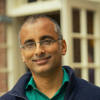Glimpses of number theory: past, present and future

Monday April 1, 2024 at 16:00, Tuttleman Learning Center, room 101
A 22-line poem written around 200 B.C. and attributed to Archimedes challenges the diligent and wise recipient to compute the number of cattle in the herds of the Sun God, after enumerating various properties of these herds. In mathematical language, the lines of the poem translate into a system of constraints amounting to a quadratic equation in two variables; but the resulting question required a further 2000 years to solve. (It turns out that the Sun God has no shortage of cows.) I will tell the story of this puzzle and its underlying mathematics, which is amazingly rich, inspiring mathematicians from Ancient Greece and medieval India to the present.
Wednesday April 3, 2024 at 11:00, Wachman 617
It is a remarkable fact that there is a duality on the set of compact connected Lie groups; this duality interchanges, for example, the rotation group in three dimensions, and the group of unitary two-by-two matrices with determinant 1. This duality emerged in mathematics in the 1960s and, independently, in physics in the 1970s. In mathematics, it has served as an organizing principle for a great variety of phenomena related to Lie group theory, much of which falls under the heading of the "Langlands program". I will describe some of the history and then two more recent developments: the realization that the mathematical and physics contexts for the duality are actually related to one another, and my recent work with Ben-Zvi and Sakellaridis where we seek to incorporate into the duality spaces upon which the group acts.
Wednesday April 3, 2024 at 14:00, Wachman 617
It is likely that developments in automated reasoning will transform research mathematics. I will discuss some ways in which we mathematicians might think about and approach this. The talk will *not* be about current or potential abilities of computers to do mathematics - rather I will look at topics such as the history of automation and mathematics, and related philosophical questions.